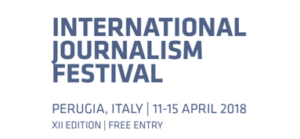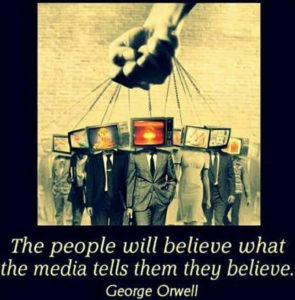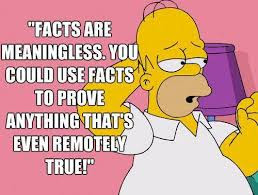22 April 2018 (Rome, Italy) – The most frequent conversation (outside of Facebook) I had in Perugia … both in sessions and in the after-event chats in bars … was that in the “Fox News era”, a nation that turned against Nixon’s corrupt rejection of the rule of law may not even exist anymore. This is an exposition on the corrosive nature of media manipulation in the U.S.
Two days after Trump was elected, Zuckerberg was asked whether Facebook had “distorted the way that people perceived the information during the course of the campaign.” He replied, “Voters make decisions based on their lived experience.”
But online experience and lived experience become more inseparable every day. If what people see online is supposed to have no impact on what they do in the world, what is the point of social media? Yes, it is hard not to instinctually bristle at this notion. We all like to see ourselves as autonomous, intelligence agents. But we are governed by myriad ideological, social, economic, political, and psychological forces that mitigate the parameters of our knowledge.
A decade ago, the upstart entrepreneurs of Silicon Valley promised to topple the gatekeepers in journalism, business, and politics. They have succeeded. Now, although they go to great lengths to deny it, the former upstarts have become gatekeepers themselves.
For almost a week after the Cambridge Analytica scandal broke, Zuckerberg remained silent, while his company lost nearly fifty billion dollars in stock value. Then he embarked on another of his “apology tours”, which included a media conference call shortly before his Congressional appearance. Alex Kantrowitz, of BuzzFeed, asked whether Facebook would consider making less profit in order to protect users’ privacy. Zuckerberg proceeded to answer a question that he hadn’t been asked, about ad relevance, a standard distraction tactic of his.
Note: if Kantrowitz had a follow-up question, no one heard it. Facebook (and other reporters’ phones) are muted after their initial question. But that is a standard tactic used by companies to “control the narrative” in these media events, not just a Facebook tactic.
It used to be axiomatic. Look at Nixon and Watergate. There was a misdeed, there was exposure, and there was a response. The system ends up being “cleansed” if you’d like.
Now, we have a system seemingly immune to exposure. To many journalists at the Festival, especially American journalists, there was this foreboding, that in the “Fox News era” the nation that once turned against Nixon’s corrupt rejection of the rule of law no longer exists. There is this feeling that if the Mueller investigation shows Trump and his Mafia band guilty of gross malfeasance the pro-Trump media, led by Fox, would give cover, and huge swaths of Americans would be encouraged to believe that the Mueller action was not only unjustified but absolutely unnecessary. Yes, no doubt (at least to me) that Fox News is assaulting America’s constitutional order and the rule of law, while fostering corrosive and unjustified paranoia among its viewers.
So the entire right-wing media machine kicks to life and dismisses the whole Mueller thing as a scam – and conservatives believe them. The conservative base remains committed to Trump, politicians remain scared to cross the base, and U.S. politics remains stuck in partisan paralysis, unable to act on what Mueller discovers.
I no longer live in the United States and return only when I must so I am not barraged by the 24/7 media madness. But there is one thing that blares out at me in all of this political uncertainty: the complacency about American democracy by its leaders, which means that to sustain democracy it will be a much harder task in the future.
Yes, yes. I know. In the brief history of mankind no democracy or republic has ever lasted. Even the U.S. will have its denouement. But I am pretty fed up with all the time spent on defining “fascist”. There are plenty of other nasty kinds of authoritarian regimes. I’ve been in their countries.
We know by now what can happen when the institutions of representative government become bitterly polarised, when large swathes of the electorate lose the capacity to compromise, when power and wealth pile up in the hands of elites and when those in charge of the state give up the challenge of responding to widespread economic hardship. History is not a one-way street and democracy has turned authoritarian before. Can it happen again? Why not? As the historian Matthew Taylor has said:
Anarchy is dysfunctional by definition, and reliance upon the tyrrany of majorities inevitably leads to the emergence of demagogues, who bend those majorities to create their own versions of authoritarianism. We see that forming now, in early stages, in the United States.
There is alive in the U.S. an organized campaign to discredit the American press. This campaign is succeeding. Its roots are long. For decades the Republican coalition has tried to hang together by hating on elites who claim to know things, like “what is art?” Or: “what should college students be taught?” Or: “what counts as news?” The media wing of this history extends back to Goldwater’s campaign in 1964. It passes through Agnew’s speeches for Nixon in 1969, and winds forward to our own time through William Rusher’s 1988 book The Coming Battle for the Media (which I read this weekend thanks to a recommendation by Jay Rosen), then through the growth of conservative talk radio, and in the spectacular success of Fox, which found a lucrative business model in resentment news, culture war, and the battle cry of liberal bias.
As Jay Rosen has pointed out, Donald Trump is both the apotheosis of this history and its accelerant. He has advanced the proposition dramatically. From undue influence – that was Agnew’s claim – to something closer to treason: “enemy of the people.” Instead of criticizing The Media for unfair treatment, as Agnew did, Trump whips up hatred for it. Some of his most demagogic moments have been attacks on the press, often by singling out reporters and camera crews for abuse during rallies held in an atmosphere of menace.And it starts at the top with the President’s almost daily attacks on “the fake news,” and his description of key institutions – the New York Times, the Washington Post, CNN, NBC – as both failing and corrupt. Contempt thus has two places to settle. As Jay Rosen pointed out at the Festival:
At the bottom of the pyramid is an army of online trolls and alt right activists who shout down stories critical of the President, and project hatred at the journalists who report them.
Between the President at the top and the base at the bottom are the mediating institutions: Breitbart, Drudge Report, Daily Caller, Rush Limbaugh and especially Fox News.
As I have noted in previous posts: the great divide of our times is not left versus right, but true versus false.
The campaign to discredit the American press operates differently on the three major sections of the Trumpified electorate: supporters, opponents, and those who are not in either camp. For core supporters, media hate helps frames the president as a fighter for them. “I will put these people down for you” was one of the most attractive promises Trump made during the campaign. He has delivered on that pledge. They in turn deliver for him by categorically rejecting news reports that are critical of the President, in the belief that biased journalists are simply trying to bring their guy down.
The anger, despair and disbelief that Trump inspires in his most public doubters is felt as confirmation, and consumed as entertainment by his most committed supporters- and his trolls.
I will end this piece with these points, summarising Rosen and Mathew Ingram who I noted at the beginning of this piece, plus some of my thoughts:
1. There is a risk that Republican elites will fail to push back against Trump’s attacks on democratic institutions, including the press, even though these same elites start their day by reading the New York Times and Washington Post. This too has already happened.
2. There is a risk that journalists could do their job brilliantly, and it won’t really matter, because Trump supporters categorically reject it, Trump opponents already believed it, and the neither-nors aren’t paying close enough attention.
3. In a different way, there is a risk that journalists could succeed at the production of great journalism and fail at its distribution, because the platforms created by the tech industry have overtaken the task of organizing public attention.
4. There is a risk that the press will lose touch with the country, fall out of contact with the culture. Newsroom diversity is supposed to prevent that, but the diversity project has been undermined by a longer and deeper project, which Jay Rosen calls “The View from Nowhere”.
5. The press is at risk of losing its institutional footing. For example: In the hands of Sean Spicer and Sarah Sanders, the White House briefing has gone to ruin. It was always frustrating, now it’s useless and frequently counter-productive.
My thoughts? Many floors below the surface of journalism there are bedrock attitudes that make the practice possible – and thinkable. There is a risk of erosion there. One example is the shared belief that there exists a common world of fact that can be established through inquiry. That’s dead. When the President of the United States forcefully rejects the premise of a common world of fact, and behaves like there is no such thing, any practice resting upon that premise is in political trouble.
This has happened to journalism. And no one knows what to do about it. To me, the real risk is that established forms of journalism will be unable to handle the strain that Trump’s behavior puts upon them. For example: the form we came to call fact checking has had zero effect in preventing him from repeating falsehoods. Zero.
There is a risk that journalists will hang onto these forms way past their sell-by date because it’s what they know. They want things to be normal. Access to confusion and disinformation serves no editorial goal, but “access journalism” remains basic to White House reporting.
I will close with something Jay Rosen said in one of his presentations:
Read the Michael Lewis/Steve Bannon interview from earlier this year: “The Democrats don’t matter,” Bannon said. “The real opposition is the media. And the way to deal with them is to flood the zone with shit.” To this kind of provocation (“The real opposition is the media…”) Marty Baron, editor of the Washington Post, has a succinct reply: “We’re not at war, we’re at work.”
Right now, to me, the U.S. is no longer a democracy but “Government by Hallucinating Mob”, driven mad by the Internet. Little wonder then that the U.S. Presidential election in 2016 felt like a choice between cancers. Politics, as practiced, is pretty tedious fare. Not much of it can get through a machine that runs on the sensational.


